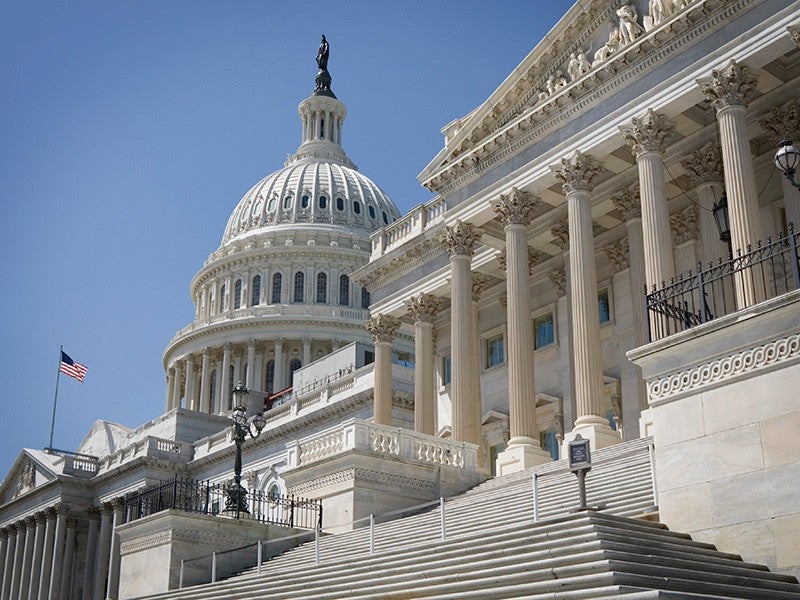Government Funding Bill Will Pave the Way for More Ambitious Environmental Agenda
We look forward to working with President-elect Biden and Congress to make the needed investments to tackle the COVID-19 and the climate and environmental justice crises in the coming years.
Today Congress will vote on end-of-year legislation to fund the government, which also includes new energy provisions and relief funding to address the COVID-19 pandemic crisis. The package includes more than 1,500 pages of key funding and reauthorizations to fight climate change, support frontline communities, and protect our environment. However, the bill also contains harmful provisions, especially the nearly $1.4 billion in funds for the Trump administration’s border wall construction, causing widespread devastation to air, water, communities and wildlife along the border.
Today’s agreement provides much-needed assistance to families, communities and small businesses suffering from the worsening COVID crisis. It also advances important policies and funding that build momentum to tackle climate change, paving the way for more renewable energy and cutting harmful pollution like diesel emissions and super polluting hydrofluorocarbons, or HFCs.
This deal provides a foundation on which the incoming Biden administration must build with its more ambitious climate and environmental justice agenda. We look forward to working with President-elect Biden and Congress to make the needed investments to tackle the COVID-19 and the climate and environmental justice crises in the coming years.
Unfortunately, at the same time, this agreement gives handouts to mining and fossil fuel industries. The additional border wall funding in the package advances the Trump administration’s cruel, hateful, and environmentally destructive border agenda. Reversing this agenda must be a top priority in the new year.
Thank you to House and Senate leadership and to the committees that worked tirelessly on this deal. We sincerely thank Representative Lowey for her years of service in fighting for environmental and public health priorities, and for paving the way as the first Chairwoman of the House Appropriations Committee. We congratulate Representative DeLauro in her new role as Chair of House Appropriations Committee next Congress.
Key Funding and Policy Provisions:
- $125 million for Low or No Emissions program, which is a critical source of funds for transit agencies to invest in zero emissions vehicles.
- A Clean School Bus Grant program, prioritizing grants in environmental justice communities.
- $90 million for Diesel Emissions Reduction grants and a reauthorization of this important program through 2024. The bill also focuses these grants to improve air quality in non-attainment areas.
- Extension of clean energy tax provisions, providing much-needed support for the renewable energy industry to support jobs while tackling climate change.
- Inclusion of legislation to phase down hydrofluorocarbons, avoiding a half degree centigrade of warming.
- Modernization and reauthorization through 2025 of the Weatherization Assistance Program, which supports increasing weatherization and energy efficiency for low-income households.
- $3.75 billion for the Low Income Home Energy Assistance Program, which reduces household energy burdens and ensures that families have access to the energy they need.
- Protection from oil and gas drilling for the Chaco Culture National Historical Park.
- A request that EPA investigate linkages between exposure to pollution and increased risk for adverse health outcomes from communicable respiratory diseases.
- Language curtailing the environmental review process for mining “critical minerals” is not included, although the bill does incentivize destructive mining.
- Language is included that prevents uranium mining harms to indigenous communities and public lands in the advanced nuclear energy program.
- A new research program is created focused on recycling critical minerals, which will help reduce the need for mining.
- Holds the line and excludes a provision that would have given corporations blanket liability immunity for reckless behaviors during the pandemic. Employees and consumers have a right to hold irresponsible businesses accountable in court.
- $14 billion in pandemic relief funding for public transit. Many essential workers, seniors, low-income and communities of color rely on public transit to get to work and access important services, while risking their lives during a pandemic to get there.
- Increases in SNAP benefits for all SNAP participants, including $5 million to add additional retailers to online SNAP that includes farmers markets and other direct to consumer sales
- $13 billion in new agricultural aid to support farmers and ranchers, including direct payments to producers, and supplemental payment to producers forced to disrupt operations due to COVID.
- $75 million for the Farming Opportunities Training Outreach program and providing additional flexibilities to support minority, tribal, veteran, and beginning famers access to USDA disaster programs
- $2 million in funding for North Atlantic right whale-related research, development, and conservation
Harmful funding and policy provisions:
- $1.375 billion for border wall construction, the same amount as last year, causing widespread devastation to air, water, communities and wildlife along the border.
- $75 million to start a “strategic uranium reserve”. This bailout for the long-languishing uranium mining industry is concerning because of uranium mining’s toxic and racist legacy, particularly in places like the Grand Canyon watershed where indigenous communities already suffer from Cold War efforts to mine uranium.
- Fossil energy provisions that are a distraction from the innovation and investment we need in pollution-free energy to build a just and equitable future.
Established in 1989, Earthjustice's Policy & Legislation team works with champions in Congress to craft legislation that supports and extends our legal gains.
Earthjustice Media Relations Team
media@earthjustice.org
